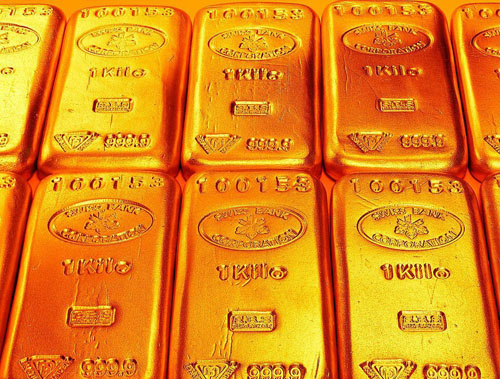 以下是环球基金(The Encompass Fund)共同经理人Malcolm Gissen先生客座博客的原文。
以下是环球基金(The Encompass Fund)共同经理人Malcolm Gissen先生客座博客的原文。
自2002年开始,我就投身于黄金和其他商品的投资买卖当中,因此,我的观点有一定的权威性。我认为一切商品的价格都是难以预测的。
然而,我唯一非常确定的是,连续12年增值后,黄金价格在2012年仍将继续走高。以下是原因:
1. 全世界的中央银行会争相购买黄金。
过去的两年里,全世界的中央银行——尤其是亚洲和拉丁美洲的中央银行,已经成为黄金的净买方。此趋势很可能持续下去,因为银行都想摆脱单一的美国和欧洲货币,提高总储备金中黄金的比例。
2. 欧洲投资者很恐慌。
恐慌的欧洲投资者们不得不开始关心欧盟和银行的生存问题。《世界黄金协会》2011年第3季度的报告中爆出了欧洲创造的季度记录——第3季度欧洲黄金投资总额高达46亿欧元。然而,这种趋势还将持续下去。
3. ETFs(交易所买卖基金), ETFs, ETFs。
在这金融危机不断的特殊时期,投资者通过投资黄金来预防风险和保护自己,而ETFs使这一切变得更加容易。黄金交易所交易基金在2011年第3季度流入77.6顿,比2010年同期增加了58%。随着黄金ETFs不断扩大到世界其他领域,作为投资的黄金需求将只增不减。
4. 中国人也喜欢黄金首饰!
中国是一个认可黄金价值的国家,2011年第3季度,日益壮大的中国中产阶层为黄金需求增长作出的贡献比2010年同期增加了13%。为满足不断扩大的市场需求,黄金首饰的零售连锁店已经延伸到中国更小的城市。因为收入还会继续增长,中国人步入中产阶层的数目会跟着增长,这无疑会为黄金需求创造一个更加庞大的市场。
5. 更易开采的金矿已经被发现了。
黄金的供应曾一度陷入困境。寻找大量黄金存货变得更加困难,把仅剩的存货拿出来也要冒更大的风险;获得开采许可越来越难,时间成本也越来越高;有经验的地质学家既难找,又要支付昂贵的费用;建立矿厂和从事生产的资本投入飙升到30至50亿美元都不足为怪。同时,从最初发现金矿到最后开办矿厂进行生产,这个过程动辄长达10年。
全球2011年第3季度的黄金需求(据《世界黄金协会》最新的可靠数字)高达577亿美元,比1年前同期增长了6%(去年这一数额为450亿美元),创造了有史以来最高的季度记录。
想象一下,如果有一天黄金的需求明显超过供给,对政府和金融局势的信心跌到有史以来的新低,战争和恐怖行动已经成为家常便饭,世界主要经济体中的多数要么发展缓慢、接近萧条,要么停滞不前,到那时候,投资者有什么理由卖掉自己的黄金?因此,对我来说这些没有多大意义。
The following is a guest post by Malcolm Gissen, co-manager of The Encompass Fund.
As someone who has been buying gold and other commodities since 2002, I can say with some authority that it is difficult to predict the price of any commodity.
However, one thing I’m fairly certain about is that after 12 consecutive years of increasing value, gold will continue to go higher in 2012. Here’s why:
1. The world’s central banks are buying. For the last two years, central banks around the world—notably those in Asia and Latin America¾have become net buyers of gold. That trend is likely to continue as the banks seek to diversify away from U.S. and European currencies and increase their allocation to gold as a percentage of their total reserves.
2. Europe’s investors are nervous. Nervous European investors are concerned about the survival of the European Union and of their banks. As a result, the World Gold Council reports that in the third quarter of 2011, Europe set a quarterly record, investing E4.6 billion in gold. This trend is likely to continue.
3. ETFs, ETFs, ETFs. During this time of unceasing financial crises, ETFs have made it easier for investors to shield themselves with investments in gold. The gold Exchange Traded Funds saw an inflow of 77.6 tons in the third quarter of 2011, a 58% increase from the same period in 2010. With gold ETF’s expanding to other parts of the world, the demand for gold as an investment should only increase.
4. The Chinese love gold jewelry, too! In a society that values gold, the growing Chinese middle class helped fuel a 13% increase in the demand for gold in Q311 compared to Q310. Retail jewelry chains are expanding to smaller cities to meet this growing demand. As the incomes of Chinese citizens are likely to continue to rise, the number of Chinese reaching middle class status will also increase, creating a significant market for gold.
5. The easy gold has already been found. Gold supplies have been constrained for some time. It’s more difficult to find large gold deposits and increasingly challenging to bring remaining stores out of the ground. The process of obtaining mining permits is difficult and time-consuming. Skilled geologists are both hard to find and expensive. The costs of building a mine and getting into production have soared to the point where capital expenditures of $3-$5 billion are not unheard of. In addition, it can take up to 10 years from the initial discovery of gold to get a gold mine into production.
Global demand for gold in the third quarter of 2011 (the most recent available numbers from the World Gold Council) increased 6% from one year earlier to $57.7 billion (up from $45 billion), an all-time quarterly record.
At a time when demand is clearly outstripping supply, when confidence in our governments and financial institutions is at an all-time low, when wars and acts of terror have become a daily occurrence, when most of the world’s largest economies are either slowing down, near recession or barely accelerating, why would investors sell gold? It does not make much sense to me.
 以下是环球基金(The Encompass Fund)共同经理人Malcolm Gissen先生客座博客的原文。
以下是环球基金(The Encompass Fund)共同经理人Malcolm Gissen先生客座博客的原文。
